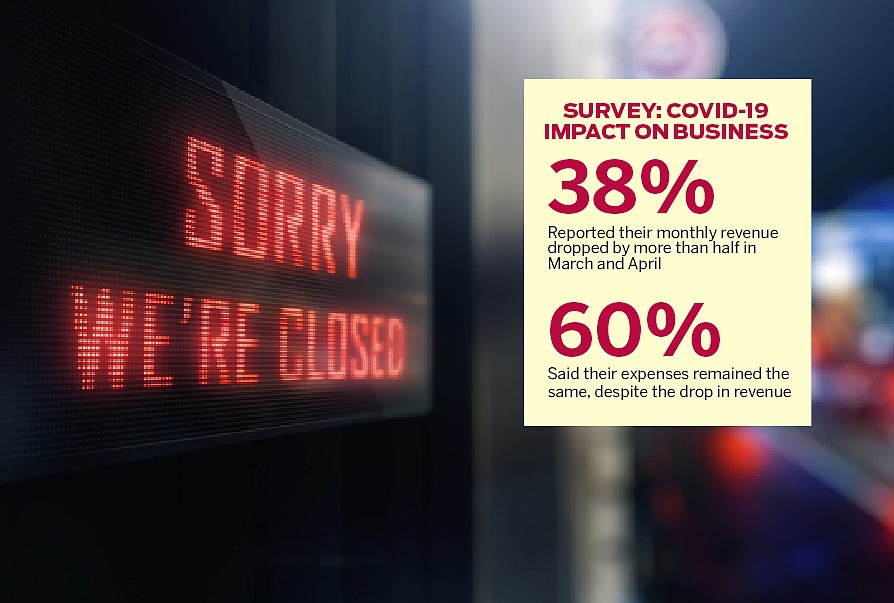
Area businesses report that in general, COVID-19 has taken a toll on their bottom lines and in many cases, a big one.
Almost four of 10 area businesses – 38% – reported in a survey their monthly sales dropped by more than half in March and into April, when the city and state closed much of the economy to stem the spread of the coronavirus.
At the same time, almost 60% said their expenses remained the same, showing the pandemic’s squeeze on how they are making ends meet.
“My business is down 95%,” said one. “Will likely have to close if this goes on another 2 months,” warned another.
That may be one of the main reasons that almost one-third want the economy to reopen now rather than later.
That 31% was a higher percentage response than any of the other options in a COVID-19 survey taken online April 20-27.
The Jacksonville Daily Record and Record & Observer surveyed subscribers and members of the NAIOP Commercial Real Estate Development Association Northeast Florida Chapter and The Jacksonville Bar Association. Responses totaled 183.
Almost seven weeks ago, Mayor Lenny Curry shut down city event venues as well as stores, restaurants, malls, entertainment centers, churches and nonessential businesses to stem the pandemic.
He and Gov. Ron DeSantis issued executive orders declaring a state of emergency through April 30 and ordered residents to stay at home and to practice social distancing when they go out.
Both are announcing plans this week for their next steps toward reopening the economy.
When to reopen
Of the other survey responses about when their business and industry sector should be allowed to reopen, 15% said no later than May 31 and another 15% said when new reported cases of COVID-19 in the region have declined seven consecutive days.
Several businesses commented in the online survey that they are considered essential by the city and state and have not closed.
About four in 10 businesses remain fully open, operating as usual, and almost as many are partially open with limited operations.
Several voiced concerns about that.
“My industry wasn’t closed, but I have compromised health and I’m concerned that we’ve partially locked down for nothing if we rush right back now,” said one.
“We are open,” said another. “But until the public is confident that there will be recovery, there will be virtually no traffic.”
Another said businesses should open “when science and fact show that the community is safe and the disease is manageable on the retreat.”
One said probably toward the end of summer. “My business requires extensive domestic and some international travel, so local cases are not the only consideration.”
The Jacksonville Daily Record and Record & Observer surveyed subscribers, readers and members of the NAIOP Commercial Real Estate Development Association Northeast Florida Chapter and The Jacksonville Bar Association.
‘Nothing about this is usual’
By and large, the survey respondents were owners or presidents and CEOs. Before COVID-19, almost nine out of 10 employed fewer than 100 people.
In general, they represented real estate, finance, insurance, banking, food service, business services, legal services, nonprofits and the arts.
Of those that remain fully or partially open, eight of 10 said their employees were working remotely – and more than half said staff was almost completely working from home.
Some said they are open, but their clients closed or suspended operations.
One business owner said it is open by phone and online, but not to walk-in clients. It has a strong Jacksonville client base, but most customers are from the U.S., Canada and the United Kingdom.
“Nothing about this is usual,” the owner said.
Some gave specific thanks.
“Preexisting home construction has not stopped (thank you contractors) and houses under contract continue to close (thank you buyers, lenders and closing attorneys), but there are little to no showings and there is a void in the pipeline,” said one response.
The survey found that 83% of employers who responded said they retained all of their staff, although 49% of respondents to a separate question said they have reduced pay, hours, benefits or a combination.
Asked how many employees were laid off, 15% said 1-50 and three responses said more than 50.
Most of the small businesses, 73%, applied for federal relief funds and loans, and almost all said they asked for that or for state help or conventional bank loans.
Almost two-thirds said their businesses likely would survive through May 31 without federal relief or a loan.
Of the others, they expect a 50% or less probability of surviving without funding.
‘Confidence has been damaged severely’
When it’s time to reopen, almost half of the respondents prefer that DeSantis lift stay-at-home orders county-by-county based on COVID-19 data.
Almost a third said the decision should be up to city and county governments.
One in 10 responses said the decision to reopen should be left to each business owner.
When it is time to reopen, respondents say their top priorities include having enough returning employees, acquiring inventory, knowing how long before employee pay can return to pre-COVID-19 levels and having enough working capital to restart business.
“Replenishing a pipeline of prospective clients,” said one respondent. “This will take six-12 months minimum, confidence has been damaged severely.”
The response said the demand for financial products and services was down about 75% or more.
“People hoard cash in times like these.”
A travel firm operator said it had not closed, but is worried about how long it will take for the industry to bounce back.
“Leisure travel is a luxury and many people are concerned about their financial well-being in the long run due to loss of jobs or reduction in pay,” it said.
While the owner believes that the industry will come back and be stronger as a result, “the question is when.”